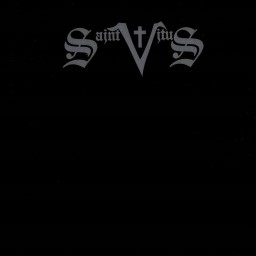 Review by Sonny for Saint Vitus - Saint Vitus (1984)
Review by Sonny for Saint Vitus - Saint Vitus (1984)
The mid-1980s finally bore witness to the dawn of the doom age. The proto-doom metal of acts influenced by Black Sabbath, such as Witchfinder General, was finally usurped by "true" doom metal from the likes of Trouble, Pentagram and the subjects of this review, Saint Vitus. Forming in 1978 as Tyrant, the band released a demo tape in 1979 which was mostly comprised of tracks that would eventually surface on their first two albums. They changed name in 1981, the new monicker inspired by the Black Sabbath track, "St. Vitus Dance", from the Volume 4 album. Saint Vitus originally found little favour with metalheads as their slower, downtuned style was at odds with the burgeoning speed, thrash and power metal scenes, seeing the band struggling to find a recording deal. Until, that is, they caught the attention of Black Flag's Greg Ginn who signed them to his SST label just because they were so at odds with what was popular in metal at the time. This association finally led to the release of the band's self-titled debut in February of 1984, making it one of the very first official "genuine" doom metal albums.
For a band that struggled to gain acceptance, the band membership remained remarkably stable in the early years. The quartet of guitarist Dave Chandler, vocalist Scott Reagers, drummer Armando Acosta and bassist Mark Adams who recorded that demo all the way back in 1979, was the same lineup responsible for the debut full-length five years later. Possibly due to their involvement with the hardcore punk scene, Saint Vitus have never really gone in for sprawling albums, keeping their full-length albums quite concise, with the S/T's five tracks weighing in at just 35 minutes. Opening with the paciest track of the five, the eponymous "Saint Vitus", the most striking initial aspect of the band's sound is Dave Chandler's filthy, fuzzed-up and downtuned guitar that sounds like the buzzing of a horde of seriously pissed-off hornets and achieves an atmosphere of darkness that few at the time could match. Chandler is ably supported by Adams' basswork, which is as effective at deepening and strengthening the riffs as Geezer Butler's is on those early Sabbath albums, although Vitus sound way more grimy and brooding than Sabbath ever did in all honesty.
Much like Ozzy and Witchfinder General's Zeeb Parkes, Scott Reagers isn't exactly what anyone would call a technically superb vocalist with a wide range, but his reedy and slightly nasal delivery is actually a lot more robust than you would expect and is well-suited as a counterpoint to the deep and warmly resonant guitar sound with the poor fella occasionally sounding like he has lost the plot mentally. Reagers has often been given short shrift when compared to his later replacement in the band, Scott Weinrich, but as much as I love Wino's grizzled vocals, I feel Reagers' more unhinged style suits the material on this debut better. There is something about the spirit of traditional doom metal that doesn't see technically accomplished vocalists as a requirement. I don't know whether that is down to the spiritual godfathers of the genre featuring Ozzy as their front man or if it is just a preference for dark atmospheres over technical ability, but either way it is a truism and gives an opportunity to singers like Reagers to push themselves to the fore on the strength of their vocal character and knack for creating a unique atmosphere rather than on their range and technical precision.
An underappreciated aspect of Saint Vitus' early material is their ability to write memorable and almost "catchy" riffs and songs without compromising on the inherent darkness of the tracks. The riff and chorus of the eponymous opener is every bit as catchy as Witchfinder General's eponymous track, yet has a far darker vibe to it, mainly down to the filthiness of the guitar sound. A noticeable feature of this album, whether intentional or not, is that after the relatively sprightly opener, it becomes gradually more and more sluggish in tempo, with the two tracks on side two, "The Psychopath" and "Burial At Sea" having slowed to a crawl, as if the energy has been drained from the band as they spiral further and further into darkness. With those two tracks especially, Saint Vitus laid down the commandments for doom metal - play it low, play it slow and keep it dark.
In summation I would cite Saint Vitus as one of the very earliest official full-length albums where a band went all-in and committed totally to the doom metal ethos that Sabbath promised, which, it must be borne in mind, was completely at odds with the zeitgeist of playing faster than everyone else and with an increasing emphasis on technical skill and songwriting complexity. This was a bold move for the time and, in truth, it wasn't until much later that the band gained the respect and kudos they were due for the influence they exerted on a whole genre. In fact, probably on two genres, because it is entirely possible that Saint Vitus' association with Greg Ginn had an influence on the direction of Black Flag's "My War" which was released just a month after "Saint Vitus" and which was a fundamental release in the evolution of sludge metal. All this makes "Saint Vitus" an indispensable release for fans of doom metal.
